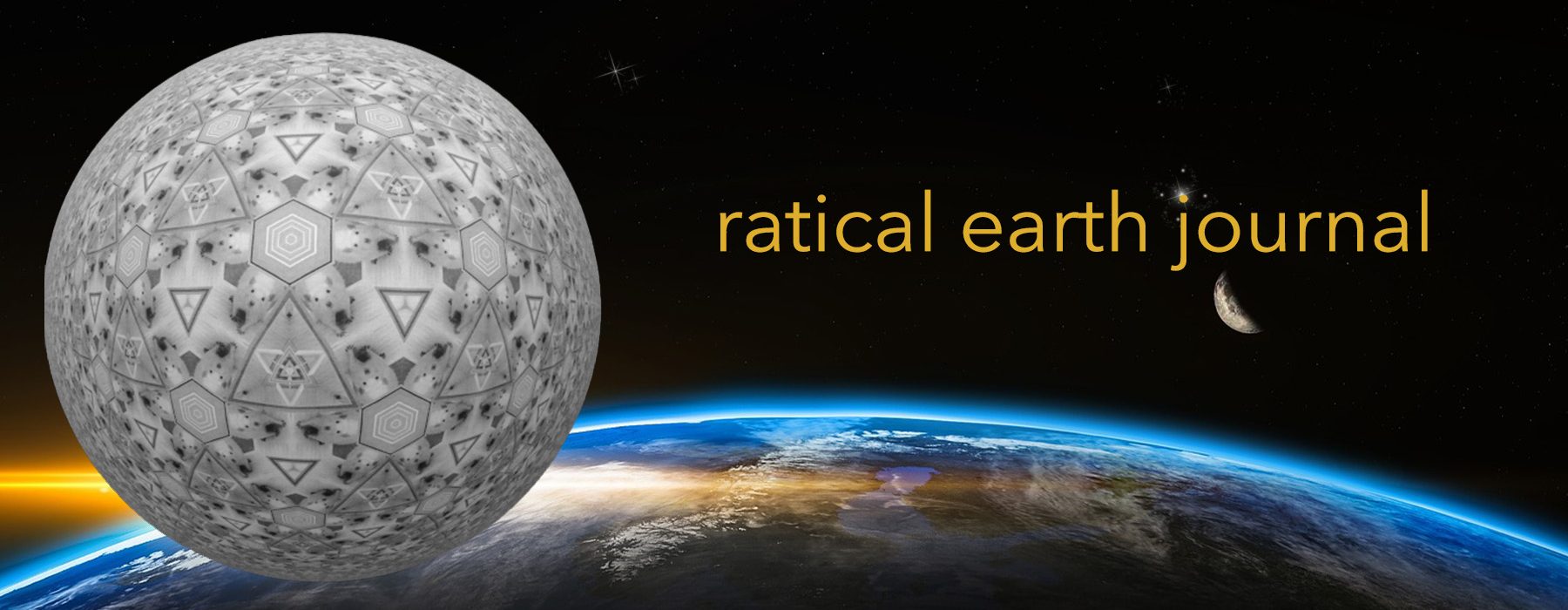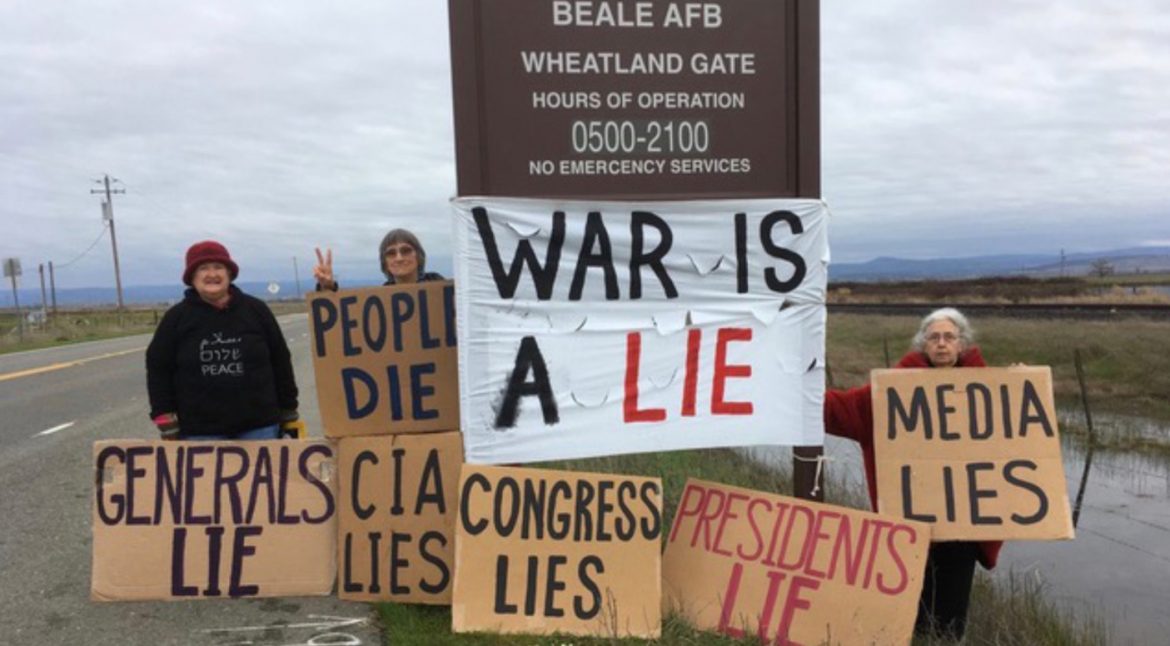Numbers don’t lie. Russia is a country of just 144 million people, with average income of $400 a month, or $13 a day. Their annual military budget is $60 billion and decreasing. The U.S. military budget is $800 billion and increasing. The U.S. has more than 800 bases encircling the world.
final dialogue of Ma and Pa in The Grapes of Wrath film (1940):
Ma
Well, Pa, a woman can change better than a man. Man lives sort of, well, in jerks. Baby’s born or somebody dies, and that’s a jerk. He gets a farm or loses one, and that’s a jerk. With a woman it’s all in one flow like a stream. Little eddies and waterfalls, but the river, it goes right on. A woman looks at it that way.
Pa
Well maybe, but we’re sure takin’ a beatin’.
Ma
I know. Heh. That’s what makes us tough. Rich fellas come up and they die … and their kids ain’t no good, and they die out. But we keep a-comin’. We’re the people that live. They can’t wipe us out. They can’t lick us. We’ll go on forever, Pa, ’cause we’re the people.
The people that live express a caring and love for all our relations, giving daily thanks for the life-giving energies of the world we all belong to by right of birth and for all that we have been given, as well as expanding the basic call to consciousness that decisions must reflect and be informed by understanding Life is sacred and that the needs of the future, of all yet unborn, must guide every choice and decision made in the present.
The following is produced by the Global Network Against Weapons and Nuclear Power in Space (space4peace.org). A wonder full example of people not waiting for someone in a white house, or otherwise so-called authority, to get on with directly communicating, connecting, and caring for our entire single, irreplaceable human family for the sake of the future of all alive now and yet to be born.
There are forms of behavior that express the greatest good human beings can manifest: affiliation, cooperation, caring, empathy, generosity, and compassion. If our species succeeds in evolving to the only next level possible—peaceful coexistence expressing a fundamental love of and respect for all Life—it will include changing consciousness that reexamines how we view conflict. Riane Eisler distills Jean Baker Miller’s articulation of this from chapter 11 of Miller’s Toward A New Psychology of Women:
As Miller writes, focusing her research on actualization rather than defense, the question is not how to eliminate conflict, which is impossible. As individuals with different needs and desires and interests come into contact, conflict is inevitable. The question directly bearing on whether we can transform our world from strife to peaceful coexistence is how to make conflict productive rather than destructive.
The three articles below were published in Space Alert! Summer/Fall 2019 Newsletter #38. Global Network Russia Study Tour Declaration leads off the front page and is a rich indicator of just what plain people—like you and me—can do and are doing to promote our chances for creative evolution to the next level. The astronomical disparity between U.S. and Russian military priorities—comparatively, Russia currently spends seven-point-five percent of what constitutes our total U.S. military budget—needs to be stated over and over and over again; repetition is vital to foster understanding of how our world actually operates and is organized. Additionally, though forgotten by or unknown to most people in the U.S., acknowledging and honoring the sacrifices made by the Russian people from 1941 to 1945—28 million Soviet citizens lost their lives fighting the Nazis—re-opens the door to mutual comprehension of our common, unitary human bond.
The second article (PDF page 5) summarizes a recent report promoting Cold War II—RAND Corporation calls for break up of Russia—articulating the connection between Russia having the largest land border with the Arctic Ocean—becoming more accessible from global overheat—and western oil corporations wanting control of that vast area. The RAND brief’s euphemistic urging of “Overextending and Unbalancing Russia” is another tragic and potentially omnicidal instance of U.S. imperial over-reach in the nuclear age driven by hubris, the deluded belief in military omnipotence, and denial of the inescapable consequences of total war employing doomsday weapons. Global Network’s mission, Prevent Confrontation: Enhance International Cooperation in Space, is even more applicable here, on the ground of our only planetary home.
Third up (PDF page 15), Space Law Conference Scheduled in India, describes how the aerospace industry has established space law departments at various universities around the world which seek to rewrite United Nations space law to privatize space for the benefit of corporate sponsors and wealthy individuals. A meeting titled “International Conference on Super Powers Domination in Outer Space and Global Sustainable Development” will be held in India in October bringing together legal experts to explore this celestial privatization issue from the point of view and interests of all humankind.
Along with the Global Network, the Center for Citizen Initiatives (ccisf.org) pursues US/Russian citizen diplomacy and exchanges. Led by Sharon Tennison, CCI began it’s work more than 30 years ago. President Gorbachev observed that the Citizen Exchanges organized by Ms. Tennison in the 1980s and 90s helped diffuse the Cold War. Their next journey is summarized here: Diplomatic Mission to the Russian Federation by U.S. citizens, September 1 – 17, 2019. “When official diplomacy is failing, when both superpowers are actively preparing for nuclear war, when both political parties openly support militarism over diplomacy, when only one version of events dominates American mainstream media … It’s time for American citizens to make their own inquiry and analysis by traveling to Russia to get additional points of view on Russia and U.S.-Russia issues. Our task is to begin personal diplomacy and intervene in war-making efforts that could end all life on our planet.”
Expanding the Lens: Explore a Wider Field-of-View. In addition, two noteworthy sources provide a wealth of information promoting thoughtful, intelligent frameworks to expand the field of view through which we see the world and our place in it:
- The American Committee for East-West Accord
From its Mission Statement: “Our fundamental premise is that no real or lasting American, European, or international security generally is possible without essential kinds of stable cooperation with Russia…. [L]ooming dangers, whose immediate cause was the U.S./EU -Russian confrontation over the future of Ukraine but whose origins lie in policy decisions taken and not taken on both sides since the end of the Soviet Union in 1991, have developed virtually without any significant public debate in the United States—in Congress, the mainstream media, academia, think tanks, or anywhere else that might influence the course of events. There may be no precedent for such an absence of American democratic discourse at such a fateful moment. The primary mission of the Committee is to promote such discussion about East-West relations and thus to create broad public awareness of the new dangers and of ways to end them. The Committee encourages open, civilized, informed debate of all the related issues, current and past, among Americans with different, even opposing, positions, perspectives, and proposals. And the Committee seeks to do this in as many ways as possible,including an informational website for engaging individuals and other groups; sponsoring or cosponsoring public events in Washington, at universities, and across the country; and in the national media, including social media.” - Johnson’s Russian List
“The JRL,” has been a favored source of Russia-related information since it was founded by Editor-in-Chief David Johnson in 1996. Like an “Early Bird” focused on Russia and related subjects, since its beginning the JRL has produced a voluminous, full-text e-mail newsletter, where its complete content resides. The JRL is a project of the Institute for European, Russian and Eurasian Studies (IERES) at The George Washington University’s Elliott School of International Affairs. The JRL also includes a content-rich website with 7 sections of Headlines, 2 Social Media Feeds, 7 ways to Follow the JRL, a plethora of wide-ranging Links, and Archives going back to 1997. Subscribe for free to the newsletter to read opinion reprints from the US as well as the Russian side to get beyond the one-sided frame of Russia filtered through US monetized media.
Humanity is fortunate in deed for the dedication towards serving Life’s needs being expressed by people involved in the Global Network (see their powerhouse Board of Directors and Advisors), the Center for Citizen Initiatives, and so many other seeds of non-hierarchical human networks—including World Beyond War, Women’s International League for Peace & Freedom, The Black Alliance For Peace, Popular Resistance, Extinction Rebellion, and Veterans For Peace—that together are heralding the only future we can successfully evolve into.
Global Network Russia Study Tour Declaration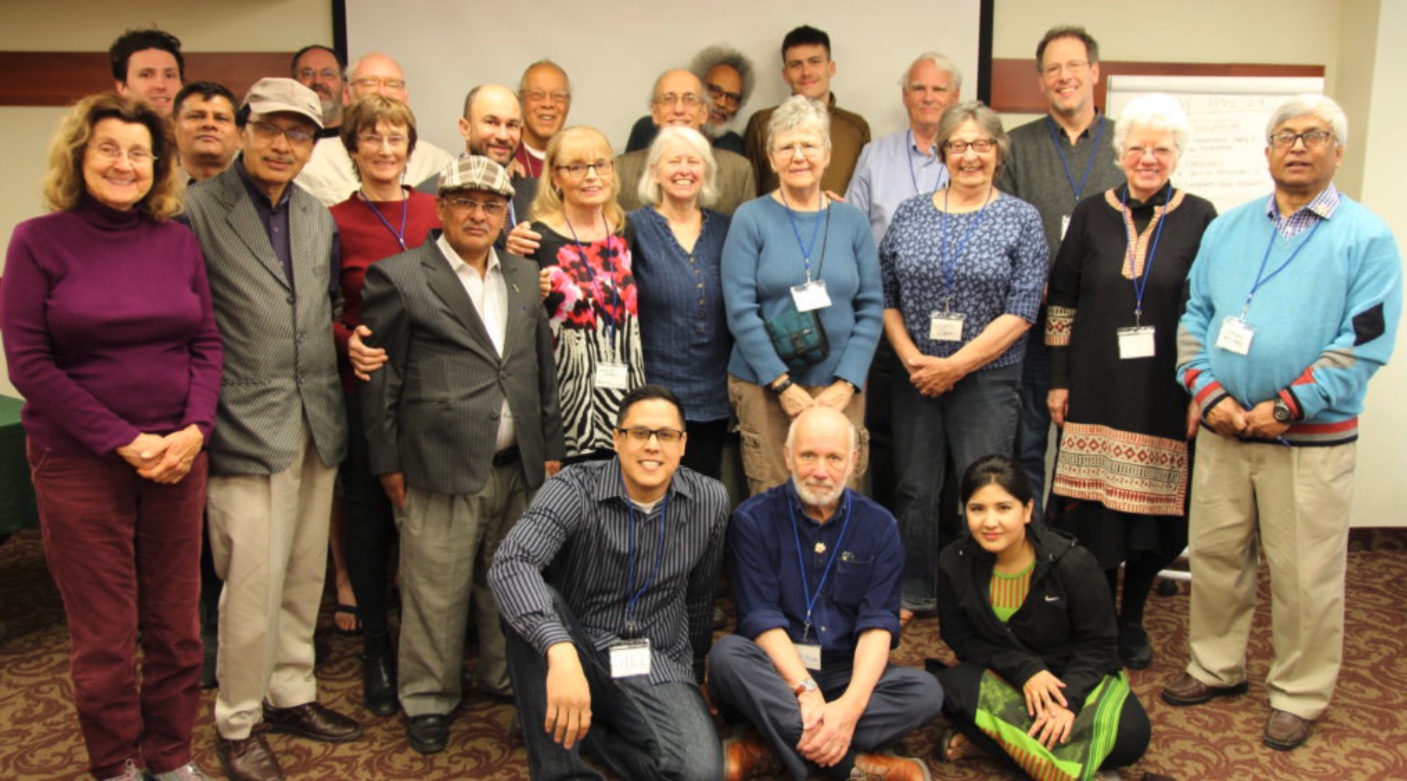 Our 24-person study tour delegation included people from the US, England, Nepal and Russia. We met in Moscow and then journeyed to Crimea and St. Petersburg. Our friends from Nepal have created a GN chapter in Kathmandu and have been trying to get Visas to our annual GN conferences for the past three years. This time they finally made it. This declaration was written with input from several members of the group under the direction of John Schuchardt (2nd from right in the back) from Massachusetts.
Our 24-person study tour delegation included people from the US, England, Nepal and Russia. We met in Moscow and then journeyed to Crimea and St. Petersburg. Our friends from Nepal have created a GN chapter in Kathmandu and have been trying to get Visas to our annual GN conferences for the past three years. This time they finally made it. This declaration was written with input from several members of the group under the direction of John Schuchardt (2nd from right in the back) from Massachusetts.
(May 9, 2019) As an international delegation to the Russian Federation of 24 individuals, we have visited Moscow, St. Petersburg, and three cities in Crimea (April 25–May 9).
We came to learn, to listen, and to build a bridge of friendship through citizen diplomacy. We have had daily important meetings with Russian journalists, activists, academics, ordinary citizens, and gained firsthand information and historical perspective. The Russian people met us with warmth, openness, and generosity.
We came because we are alarmed by the U.S. demonization of Russia and the NATO provocations which have created a world of increasing military confrontation, with the U.S. even threatening the first-use of nuclear weapons.
Since the collapse of the USSR in 1991 US/NATO has encircled Russia with bases, so-called ‘missile defense’ systems, escalating ‘war games’ right on its borders, and with warships increasing military operations in the Black Sea.
Numbers don’t lie. Russia is a country of just 144 million people, with average income of $400 a month, or $13 a day. Their annual military budget is $60 billion and decreasing. The U.S. military budget is $800 billion and increasing. The U.S. has more than 800 bases encircling the world.
The Russian people love their country with a warmth and depth of love that is difficult for [U.S.] Americans to comprehend. It is a love born of centuries of history, culture and religious faith, and a love born of the suffering and sacrifice of the repeated defense of their Motherland.
On Victory Day, May 9 in St. Petersburg, we walked in solidarity with 1.2 million family members and survivors of the 1941-1945 defense of the former Soviet Union when Americans and Russians were friends and allies against the German fascist invasion and occupation. (It should be remembered that 28 million Soviet citizens lost their lives during the fight against the fascists.)
Our message is a call to end the demonization of Russia, remove US/NATO warships from the Black Sea, end the escalating war maneuvers on Russia’s borders, and build bridges of diplomacy and friendship.
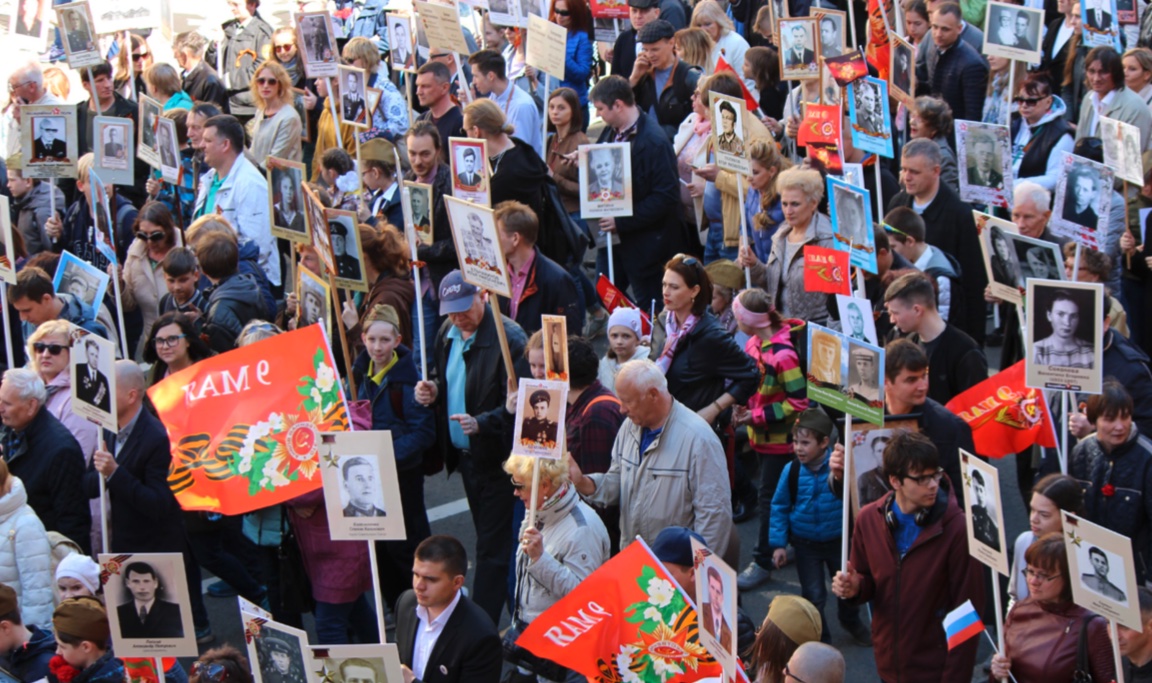 1.2 million citizens joined the May 9 march through St. Petersburg. Most of the people carried photos of their relatives who died or survived the harrowing invasion and 900-day siege of St. Petersburg (then called Leningrad) by the German fascists. All over Russia on May 9 similar marches were held—not to celebrate but to remember.
1.2 million citizens joined the May 9 march through St. Petersburg. Most of the people carried photos of their relatives who died or survived the harrowing invasion and 900-day siege of St. Petersburg (then called Leningrad) by the German fascists. All over Russia on May 9 similar marches were held—not to celebrate but to remember.
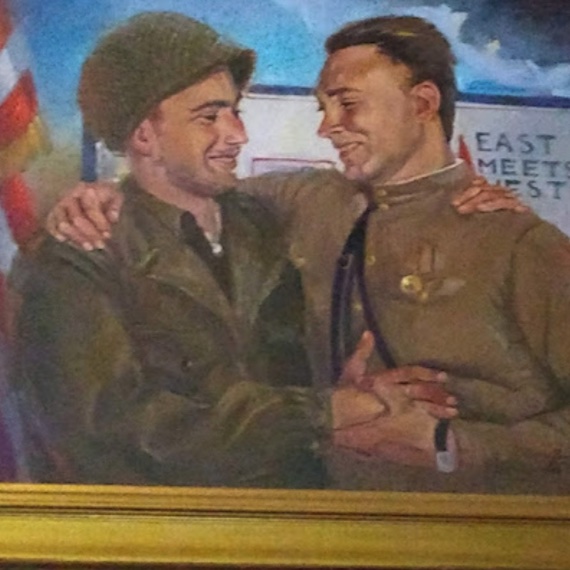 Inside the very moving Museum of the Great Patriotic War in Moscow hangs this painting of American and Soviet soldiers, then WWII allies. The Cold War ended that short-lived friendship between our two nations.
Inside the very moving Museum of the Great Patriotic War in Moscow hangs this painting of American and Soviet soldiers, then WWII allies. The Cold War ended that short-lived friendship between our two nations.
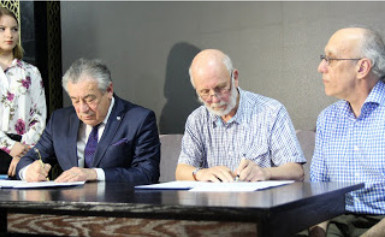 Following our participation in the May Day parade in Simferopol we were invited to a conference that gave us a chance to hear from local leaders and four members of our delegation also spoke. Afterwards the Global Network board convener Dave Webb (UK) signed a peace, friendship and cooperation agreement with Yan Epshtein, Director of the Crimean NGO called the Black Sea Association for International Cooperation. This NGO supports the 175 ethnic groups in Crimea to ensure their unique cultures are not lost. During the May Day parade many different costumes were worn representing the many distinct cultures in Crimea.
Following our participation in the May Day parade in Simferopol we were invited to a conference that gave us a chance to hear from local leaders and four members of our delegation also spoke. Afterwards the Global Network board convener Dave Webb (UK) signed a peace, friendship and cooperation agreement with Yan Epshtein, Director of the Crimean NGO called the Black Sea Association for International Cooperation. This NGO supports the 175 ethnic groups in Crimea to ensure their unique cultures are not lost. During the May Day parade many different costumes were worn representing the many distinct cultures in Crimea.
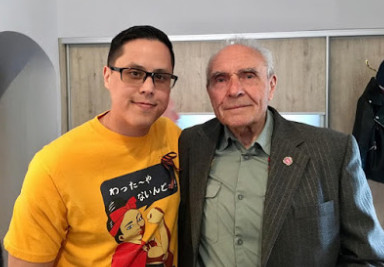 While in Yalta, Crimea some of our group met with several Soviet- era veterans. In this photo Iraq and Afghanistan war veteran Will Griffin (Pennsylvania) poses with 93-year old WW II veteran who spoke to us about his strong desire for peace with the west and also told of his deep concern about climate change.
While in Yalta, Crimea some of our group met with several Soviet- era veterans. In this photo Iraq and Afghanistan war veteran Will Griffin (Pennsylvania) poses with 93-year old WW II veteran who spoke to us about his strong desire for peace with the west and also told of his deep concern about climate change.
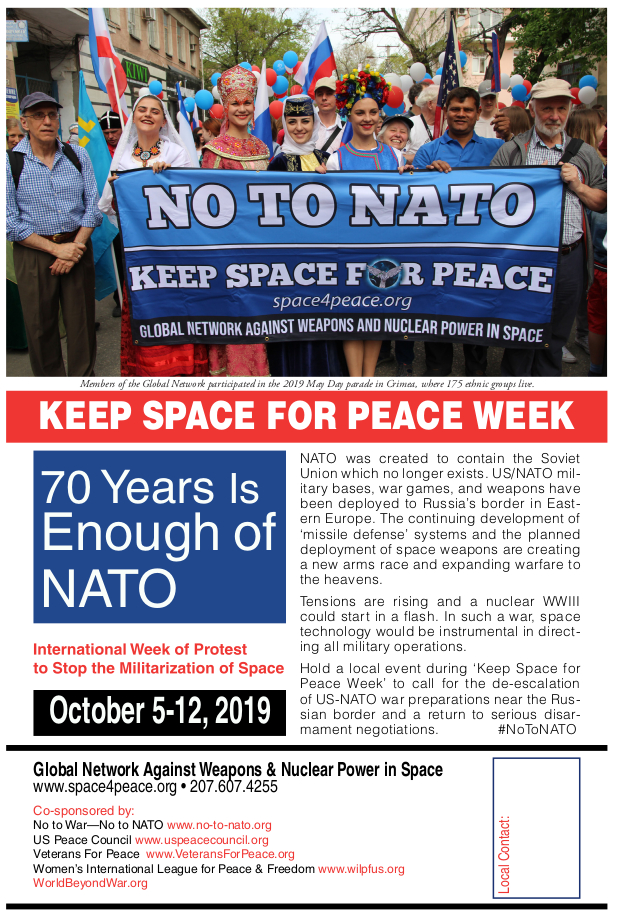
Co-sponsored by:
No to War—No to NATO www.no-to-nato.org
US Peace Council www.uspeacouncil.org
Veterans For Peace www.VeteransForPeace.org
Women’s International League for Peace & Freedom www.wilpfus.org
WorldBeyondWar.org
RAND Corporation calls for break up of Russia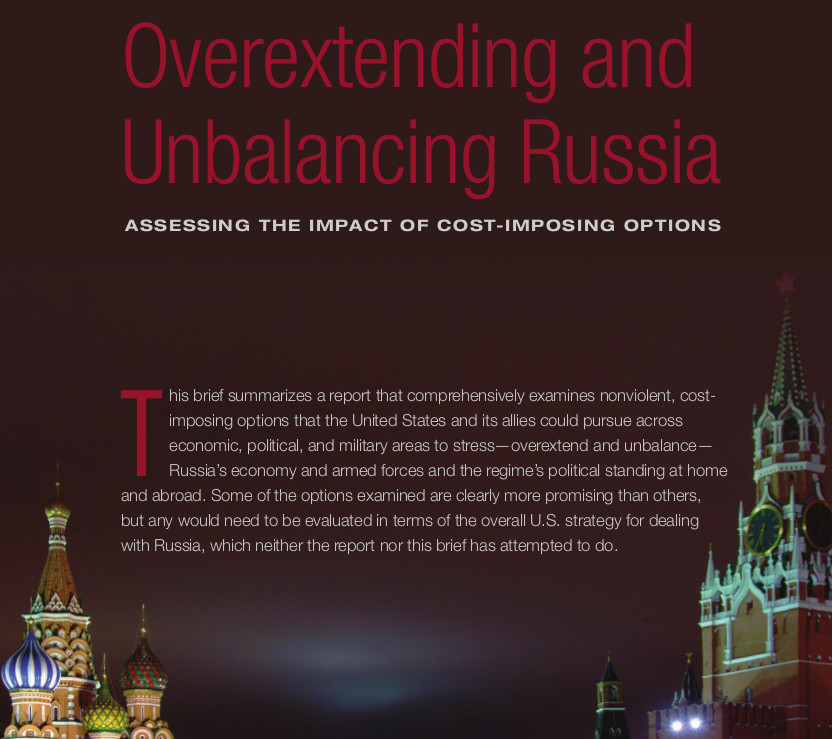
The American RAND Corporation (headquartered in Santa Monica, CA), the largest near-government center for strategic intelligence, has published a new report on Russia.
During the cold war, RAND participated in the development of a strategy of long-term competition that exhausted the resources of the Soviet economy.
Russia has the largest land border with the Arctic Ocean. As the ice melts due to climate crisis the western oil corporations want control of that vast area. The RAND Corporation study calls for the ‘balkanization’ of Russia—breaking it up into smaller nations so that the oil corporations can get control.
This is why the U.S. keeps saying they want regime change in Moscow. Ukraine is just a sideshow the US-NATO created to excuse major military escalation along Russia’s borders. Missile defense launch sites have been built in Romania and Poland and a new U.S. base in Poland will serve as a regional supply hub for Pentagon war making material. War games along the Russian border by US-NATO are escalating each year.
Russia, according to the experts of RAND, is a long- term threat (because Moscow won’t surrender its sovereignty). Therefore, the American military must prepare for armed conflict with Russia.
The report calls for these measures:
- Increase energy production in the US, which will lead to a drop in the cost of energy in the world and, accordingly, reduce the revenues of Russia.
- Introduce economic and financial sanctions.
- Increase American gas imports to Europe to take business from Russia.
- Encourage the emigration from Russia of educated youth and skilled workers.
- Supply Ukraine with lethal weapons.
- Promote the ‘liberalization’ of Belarus.
- The expulsion of Russia from Central Asia, while very expensive, is a card that must be played in due time.
- Undermining the international image of Russia will continue with the use of all available tools – a boycott at international forums, sports events, fake news campaigns, etc.
- Move US-NATO bombers closer to Russia.
- Increase the deployment of additional tactical nuclear weapons in Europe and Asia which will provoke additional Russian air defense spending.
- Increase deployment of new U.S. ‘missile defense’ systems in Europe.
- Develop new types of weapons for submarines that could attack Russian submarines.
- Increase NATO’s presence in the Black Sea. Russia will have to strengthen its defenses at its bases in Crimea.
- Increase NATO war games in Europe, which can be interpreted as a demonstration of the readiness to invade the territory of Russia.
The 12-page RAND brief summarizing the report is titled Overextending and Unbalancing Russia – Assessing the Impact of Cost-Imposing Options (HTML, PDF).
Space Law Conference Scheduled in India
International space law is a subject presently thoroughly dominated by leaders of the aerospace industry who are more than eager to privatize space to the benefit of corporate sponsors and wealthy individuals.
The aerospace industry has established space law departments at various universities around the world and are busy trying to rewrite United Nations space law that was established by the Outer Space Treaty and the Moon Treaty.
Both of those treaties state that celestial bodies and their resources are “the common heritage of mankind and that an international regime should be established to govern” their extraction.
Currently no such international agreements exist. In fact, during the Obama administration a bill was passed and signed into law giving U.S. corporations and individuals the legal authority to make land claims on the moon and asteroids. This could surely cause conflict in the future.
What is sorely needed at this time is a body of legal experts who wish to explore this celestial privatization issue from the point of view and interests of all humankind. We are now lucky to have such an opportunity as a conference is being organized in Visakhapatnam, India on October 12-13, 2019 at the Damodaram Sanjivayya National Law University (DSNLU). This conference is being co-sponsored by the Global Network (GN).
GN Advisory Board member Aruna Kammila, Assistant Professor at DSNLU, is organizing the conference which will be entitled “International Conference on Super Powers Domination in Outer Space and Global Sustainable Development.”
Ms. Kammila writes, “The people of our planet must consider the question of the kind of seed one carries from earth into the heavens. The essential objective of this conference is to give a stage to exhibit emerging issues and challenges in outer space and a contemporary analysis based on legal, political, economic as well as the scientific aspect in order to ensure peace and security in the international sphere with concern to outer space.”
Among the speakers scheduled to attend the conference will be History Professor Peter Kuznick from American University in Washington DC and Bruce Gagnon, Coordinator of the Global Network.
If interested in attending this important event please contact the GN office at 207-607-4255.
